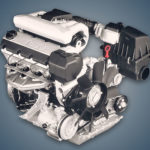BMW N42B18 engines are in-line 4-cylinder engines with DOHC gas distribution system. The predecessor of this unit model was the M43 series engines. The main feature of the N42B18 is the two overhead camshafts and the innovative VANOS system. This technology made it possible to reduce fuel consumption and reduce outlet gas pollution. And Valvetronic technology contributes to increased power by optimizing the cylinder filling with the mixture.
Specifications
| Production years | 2001-2004 |
| Displacement, cc | 1796 |
| Fuel system | injector |
| Power output, hp | 116 /5500 rpm |
| Torque output, Nm | 175 /3750 rpm |
| Cylinder block | aluminum R4 |
| Block head | aluminum 16v |
| Cylinder bore, mm | 84 |
| Piston stroke, mm | 81 |
| Compression ratio | 10.5 |
| Features | Valvetronic |
| Hydraulic lifters | yes |
| Timing drive | chain |
| Phase regulator | double VANOS |
| Turbocharging | no |
| Recommended engine oil | 5W-30 |
| Engine oil capacity, liter | 4.25 |
| Fuel type | Petrol |
| Euro standards | EURO 3 |
| Fuel consumption, L/100 km (for 316i E46) — city — highway — combined |
9.9 5.5 7.1 |
| Engine lifespan, km | ~250 000 |
| Weight, kg | 120 |
Disadvantages of the N42B18 engine
- Temperature rise. The main reason is poor cleaning of the radiator, a damaged thermostat, which just needs to be changed after every 100 thousand km of run. The consequence of this is the failure of the valve stem seals. As a result, the unit consumes excessive oil. Therefore, you should always inspect the cooling system.
- Noise. The breakage must be repaired by completely replacing the chain tensioner. Its term is plus or minus 100 thousand km. You also need to check the timing chain, which at the same time can stretch and lead to an increase in noise.
You also need to take into account that when changing spark plugs, the coils of the BREMI ignition system often deteriorate. It is better to change the latter to EPA. The N42’s powertrain loves good oils. It is better to pour only the one recommended by the manufacturer itself. The engine has a high heating temperature, and saving on oil, as a rule, leads to the need for overhaul. Often it will be necessary to replace the vanos as well.
The motor is quite economical and functional, however, it is also very capricious (it needs to be constantly monitored), and not as reliable as its predecessors, that is, the M40-M43.







Not sure where some of these numbers are from, but all BMW engines are designed for 98 octane fuel (EU rating). The official service interval is 25k km, not 10k. Though I would not recommend such long service intervals. Unit for grams is ‘g’ not ‘gr’. Engine “lifespan” is x1000 km. 250 km isn’t much and 250+ is very ambiguous.
Thank you! We have corrected the inaccurate information.